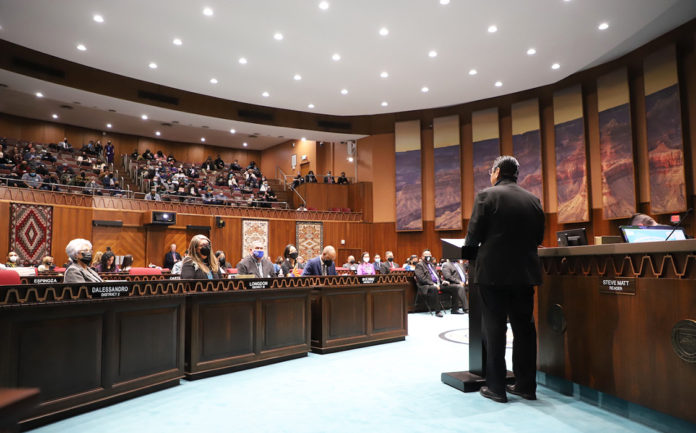
PHOENIX, AZ – Navajo Nation President Jonathan Nez was joined by First Lady Phefelia Nez and Vice President Myron Lizer as he addressed the Arizona State Legislature and tribal leaders at the Arizona State Capitol, where he spoke about the contributions and resilience of Navajo people during the COVID-19 pandemic and throughout society. He also urged state lawmakers to support the voting rights of Native American people and the Indian Child Welfare Act, while highlighting the progress of infrastructure development and access to clean water on the Navajo Nation.
“Throughout this pandemic, just as our elders did long ago during times of adversity, our Navajo people continue to step up and demonstrate the strength and resilience of our ancestors,” said President Nez. “We continue to use our way of life teachings, the teachings of our elders, to push back on COVID-19. As leaders, when this pandemic began, we didn’t hide or shy away from the dangers. We were out in the communities distributing PPE’s, food, water, fire wood, and other essential items to our people. We stood shoulder to shoulder with our frontline warriors and showed them that we love them, that we care for them, and that we are in this together. There were also many grassroots organizers and individuals who stepped up in many ways to help our people.”
He also called for a moment of silence in the Arizona House of Representatives to honor and remember former Navajo Nation President and Arizona Senator and Representative Albert Hale, who passed away nearly one year ago due to complications from COVID-19, and all frontline workers and Navajo people who passed on during the pandemic.
“Despite the heartache and losses of loved ones, our Navajo people continue to fight back,” added Nez. “Today, we have 72.5 percent of our people fully vaccinated for COVID-19 – one of the highest vaccination rates in the entire world. Of our elders who are 65 years and older, 87 percent are fully vaccinated. This shows that our elders continue to lead the way and set a great example for our people.”
President Nez also recognized and thanked Navajo state leaders including Arizona State Sen. Theresa Hatathlie (D-Dist. 7), a member of the Navajo Nation, who was sworn-in at the State Capitol on Monday to represent Arizona’s District 7, following the resignation of former State Sen. Jamescita Peshlakai, who accepted a position with the U.S. Bureau of Reclamation. He also thanked former State Rep. Arlando Teller, who stepped away from his service with the Arizona State Legislature to accept a position as the Deputy Assistant Secretary for Tribal Affairs with the U.S. Department of Transportation, under the Biden-Harris Administration.
“With Mr. Teller’s departure last year, we had another young, strong, intelligent Diné woman step up and accept the role of representing District 7,” said President Nez. “State Representative Jasmine Blackwater-Nygren, who is also with us today. We recognize your service and we pray for continued success as you represent our Navajo people in the House of Representatives. Last but not least, our brother Myron Tsosie from Chinle, AZ, who is serving his second term as a State Representative for District 7. On behalf of the Navajo Nation, I thank all of you. We are very proud to have so many young Navajo people serving and representing us in these high positions.”
In his address to state leaders, President Nez highlighted the contributions and accomplishments of Chinle Unified School District Superintendent Quincy Natay, who was recently recognized as Arizona’s Superintendent of the Year and the sacrifices of Navajo veterans and the Navajo Code Talkers, while challenging state leaders to uphold and protect the voting rights of all citizens including Native Americans.
“We are a major part of Arizona’s economy and communities. In the 2020 elections, the Navajo people came out in big numbers and changed the outcome of several elections,” said Nez. “Voting rights is a major discussion at the federal and state levels and there’s a lot of division and debate. As our state legislators proceed with the legislative session, I ask you to think of the elders that live in rural areas of the Navajo Nation, who don’t have immediate access to a post office, or voting polls on election day. Many of our elders and those living in remote communities have to drive hundreds of miles and several hours to cast their ballot, and when they get to the voting polls, they have to contend with language barriers because many are fluent in the Navajo language only, but they do it because they value their right to vote, and no one should stand in their way. We need voting laws that uphold and protect all citizens’ rights to vote.”
As the Navajo Nation continues to mitigate the COVID-19 pandemic, President Nez spoke about the investments that the Navajo Nation has made to improve access to water and electricity for Navajo families and thanked the Biden-Harris Administration and congressional leaders for supporting federal funding for all tribal nations.
“Over the last several years, the Navajo Nation has invested hundreds of millions of our own dollars for water lines, water sanitation systems, and we’ve helped bring running water to our people,” added President Nez. “Through the CARES Act funds that were received in 2020, we were able to extend water lines to some families and connect over 700 homes to the electric grid. A few months ago, the Navajo Nation also appropriated $56 million of our own funds to begin developing the Western Navajo Pipeline to help deliver more water to our communities in Arizona. As we move forward, our administration is proposing to allocate over $600 million for water infrastructure, electricity, and broadband,” continued President Nez, while also calling for the support of state leaders for water rights for the Navajo Nation.














































